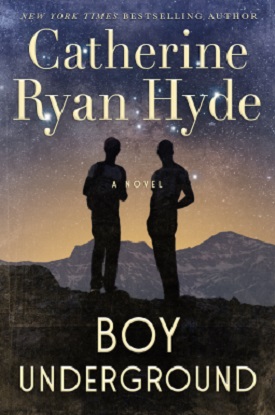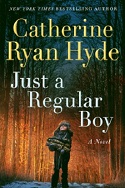 Synopsis:
Synopsis:
It is 1941. Steven Katz is the son of prosperous landowners in rural central California. His parents don’t approve, but he has established true friendships with Nick, Suki, and Ollie, all of whom are sons of field workers. The little group of friends is inseparable. But Steven is in turmoil because he’s beginning to acknowledge that his feelings for Nick amount to more than friendship.
When the Japanese attack Pearl Harbor on December 7, drawing the United States into World War II, Suki and his family are forcibly relocated to the internment camp at Manzanar. Ollie enlists in the Army and ships out. And Nick goes on the run when he is accused of a crime he didn’t commit, and betrayed by his father. He turns to Steven for help. Hiding Nick in a root cellar on his family’s farm, Steven acts as Nick’s protector and lifeline to the outside world.
As the war escalates, bonds deepen and fears of being different fall away. But after Nick unexpectedly disappears one day, the focus of Steven’s life becomes finding him. Along the way, Steven finds a place he belongs, his voice, and a lesson about love that lasts him his lifetime.
Review:

Author Catherine Ryan Hyde is an extraordinary and underrated storyteller. She has said that her goal is “to delve deeply enough into the human experience to find a sort of universality. Once you dig down underneath surface differences, we are all human beings. And all human beings want essentially the same things at our core. We want to love and be loved. We want to be safe. We want our loved ones to be safe.” With seeming ease, she weaves emotionally rich, thought-provoking stories about ordinary people facing extraordinary challenges. Her straight-forward, unembellished writing style is deceptive. What may initially appear to be simple stores are actually profound observations and commentaries about the human condition and spirit. Her unassuming protagonists, often lacking confidence and a clear vision about what they must confront, evolve into resilient, empowered people who prove consequential in other characters’ lives. She has published more than forty books, but as to Boy Underground shares, “I have to go on record as saying this is one of my favorites of mine. Theoretically authors don’t have favorites, but I more or less do. And Boy Underground either ties with Have You Seen Luis Velez? as my favorite, or knocks it just barely out of the top spot.”
Hyde also has an uncanny ability to compellingly depict the struggles adolescents and teenagers with compassion, empathy, and credibility. A number of her books are coming-of-age stories and Boy Underground is among them.
The story opens in the fall of 1941, and focuses on Steven Katz, age fourteen, who is growing up on his family’s farm in the vast agricultural wasteland situated between Fresno, California and the Sierra Nevada mountains. His family’s farm is large and employs many recent immigrants. A lot of his father’s farmhands are the parents of kids with whom Steven attends school. His mother, in particular, is very concerned that the family maintain what she deems appropriate relationships and their standing within the community. So Steven’s friendships with Nick, Ollie, and especially Suki, do not meet with her approval. “I am giving you a warning,” she tells him. “I know you think social status is meaningless, but it’s not. People believe in it, so whether you do or not, it’s going to affect you. Like if your family owns land and other families work that land. It makes them different from us.” She stops short of dictating to Steven who he can and cannot be friends with. “Unless . . . on one condition. They are American, right?” For Steven, her message is clear. But he recognizes that he is incapable of living his life in accordance with her standards.
That’s not the only reason Steven feels disconnected from his family. He has discovered something about himself that he knows he cannot share with anyone, especially his parents. It caused him to distance himself from his old group of friends. Their free use of epithets targeting boys like him became too much to bear.
He announces that he wants to go camping with his new friends — Suki, Ollie, and Nick — and elicits his parents’ grudging permission. His father overrides his mother’s concerns about winter approaching the rough mountainous country into which the plan to hike, noting that Steven has not experienced much hardship in his young life and prophetically declaring, “It’ll make a man out of him.”
The four boys depart early on December 6, 1941, on a trip that cements Steven’s burgeoning feelings for Nick. Other life-altering events take place while they are away. In the moving first-person retrospective narrative Hyde employs to convey Steven’s story, he wonders about the timing. “Is it purely coincidence when that happens? Or does some invisible universal intelligence rest its thumb on the scale.” They return from the camping trip to a changed world, puzzled when a Japanese man warns Suki to be careful. They observe a handmade sign on the window of the tavern Nick’s father frequents: “Japs Keep Walking.” At that point, Steven recalls, he realized they “had reached out new era of darkness. Not why we had, but that we had. We kept walking, the words tingling in my belly like electricity.”
The next morning, Steven’s mother tells him about the December 7, 1941, attack on Pearl Harbor. The day after that he learns that Nick’s mother left the family years earlier and his father has been arrested for severely beating another tavern patron who was rendered comatose. He initially confessed, but recanted the next morning. Worse, he claims he only lied to protect Nick and can produce a witness — who Steven inadvertently discovers has a vest interest in lying for Nick’s father.
The world is at war and before long, the friends are separated. Ollie enlists and immediately after completing basic training, he boards a supply ship transporting troops and equipment to the Pacific theater. Suki and his family are forced by the U.S. government to leave everything behind, including his grandmother’s beloved rat terrier, Akira. And Nick, facing charges for a crime he did not commit, decides he must go on the run.
Steven theorizes that a vacant root cellar on his family’s property will make a perfect temporary hiding place for Nick. It’s cold, dark, and damp, but he cannot bear the thought of losing Nick, maybe forever. He convinces Nick to hide in the cellar because he knows Nick is a true friend and dares to hope that he feels the same way Steven does. Neither boy can envision Nick having to live underground indefinitely, joined by Akira, with Steven delivering him food, books, and sneaking out of his bed to visit the root cellar in the wee small hours. As he conceals Nick from the authorities — as well as his parents — Steven is determined to find a way to convince the police that Nick is innocent since the boys’ initial statements were insufficient to keep the police from making Nick a suspect.
Seems most of the trouble in this world stems from the things we’re so sure we know. ~~ Steven in Boy Underground
Hyde compassionately depicts the trajectory of Steven and Nick’s relationship, as Steven serves as Nick’s lifeline and protector, especially when Nick’s health is jeopardized by his living conditions. Steven innocently and naively believes that his future lies with Nick, and his inner dialogue about himself, his feelings about Nick, as well as his family and the current state of the world is relatable, resonant and, at times, heartbreaking. As time passes, Steven knows that he must find his own place in the world — a place where he can be who he really is and be accepted. Will Nick be part of his future in the way he longs for? Or at all?
When he refers to Suki as his friend, one of the detectives investigating the incident involving Nick’s father chastises him. “‘My friend Suki.’ Don’t be saying that. Don’t let anybody hear you say a thing like that. We’re at war, son. . . . From now on, all your friends are white if you know what’s good for you.” He informs Steven that the U.S. government will indeed be establishing relocation centers. It is a stunning moment. Steven realizes how naive he has been because he believed that Suki and his family would simply being directed to move to a new town and start over there. “I had not pictured ‘camps.'” But he resolves that Suki will remain his friend, “and I will say still say that to anybody, anytime. Clearly I did not know what was good for me.” Hyde’s well-researched story line soon takes readers into Manzanar War Relocation Camp, one of ten sites where both Japanese immigrants (who were legally prohibited from seeking U.S. citizenship) and Japanese-Americans were interred during World War II, injecting details about life in the camp and providing a sense of what Suki and his family endure. She also credibly portrays Steven’s confusion and outrage about the treatment to which Suki and his family are subjected, as well as his guilelessness and wonder about the world as he gradually realizes the extent to which others will go in order protect themselves and their own interests.
At the outset, Steven has led a life of relative privilege, but understands what it is like to be different as a result of the behavior of and verbiage employed by the group of friends from whom he distanced himself and his family. He has always felt like an outsider, even in his relationship with his parents and older brother. At the age of fourteen, nearing adulthood, Steven is becoming increasingly confident about his identity, as well as the fact that he will not be accepted by society or the people who claim to care for him if he reveals himself. Ryan illustrates Steven’s observations about and reactions to others who are also deemed different by society, most notably Suki and his family. He is faced with choosing to be like his mother, concerned about the opinions and judgment of others, or follow his heart and behave a manner that he inherently perceives to be right. And accepts that his choice might carry consequences such as being branded a “race traitor” and called other ugly names, and the necessity to sever ties with his family, acknowledging that because of who he is, he will never be able to earn his father’s approval. Looking back on his life, Steven remembers that he kept a lot of secrets and that shame was “my default setting at that age. But I meant shame about saying the wrong thing. About being the wrong thing. Just your garden-variety teenage anxiety. I was not ashamed that I loved Nick, or that Suki was my friend. I knew I was supposed to be, but I had begun to internally refuse that burden.”
Boy Underground is a beautifully crafted tale about acceptance and tolerance — of oneself and others — and learning to draw strength from within rather than without. Once again, Hyde’s signature style elevates the story with her creation of memorable, fully developed characters and illustration of their journey to discovering and embracing strength and resilience they have no idea they possess until life boxes them in and demands that they confront uncomfortable truths. Those characters, especially Steven and Luke, are sympathetic and Hyde’s fondness for them is evident on every page. Through his experiences with Luke and Suki, Steven, a thoughtful, analytical, and principled young man, learns not just about himself, but about romantic relationships, friendship, and that being labeled different by society does not equate with being less than.
Boy Underground is a must-read selection for fans of World War II-era historical fiction, as well as readers who enjoy life-affirming coming-of-age stories populated by unforgettable characters. It is easy to see why Hyde considers it one of her favorite books. It is sure to be one of her readers’ favorites, too.


















Comments are closed.